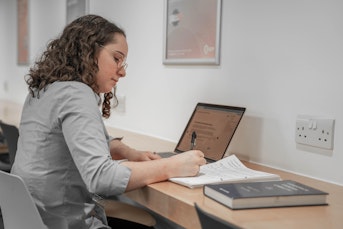How to become an accountant: a comprehensive guide

Learn about the steps to become an accountant, from education requirements to certification options. Start your accounting career journey with BPP today.
If you’re looking for a stimulating and rewarding career, then accountancy is a great choice. An accountant’s role is usually dynamic and varied, with clear progression opportunities across a range of different industries.
Becoming an accountant also offers a level of career security. Accountants are in constant demand; regardless of the economy, businesses will always need the skills of an accountant to stay in line with government policy.
Your path to becoming an accountant is open. What you’ll need to do to become an accountant will depend on what qualifications you already have, what level you want to enter your career, and what specialism you choose. Your professional qualification will be influenced by your career ambitions and the role you aim to go into.
Wondering how to qualify as an accountant? Read the comprehensive guide and find out how you can become a fully qualified accountant.
What does an accountant do?
Accountants have many responsibilities within businesses, including managing money, financial reporting, budgeting, payroll, purchasing, procurement, and tax management.
Accountants may work for an accountancy firm, where they’ll have a variety of external clients. Accountants can also be self-employed, or work in-house within a single business, where they may end up having a more varied role outside of their specialism.
How to qualify as an accountant
There are several ways you can gain qualifications that will help you work towards an accounting career.
Becoming an accounting with a degree
There is no specific degree qualification requirement to become an accountant. This means if you’re looking to become an accountant without an accounting degree, you can access this career.
However, having a degree in the following subjects could help you:
Maths
Economics
Accountancy
Business
Marketing
Finance
After your degree, you will go on to complete your accountancy qualification with a professional accountancy body.
Having a degree in a subject relevant to accountancy means you could be exempt from certain initial exams for a qualification.
Becoming an accountant without A levels
The Association of Accounting Technicians (AAT) offers formal qualifications in accounting that are equivalent to GCSEs, A Levels, and above. For those without A levels, completing your qualification through AAT will allow you to progress to becoming a fully qualified accountant. It will also make you eligible to study on a university course if you would prefer.
Becoming an accountant without a degree
If you don’t have a degree, there are still many options available to you.
Apprenticeships are a popular way to access an accountancy career. Apprenticeships allow you to qualify while gaining invaluable professional experience and earning a salary.
You could also complete a foundation qualification with AAT, allowing you to progress onto a higher-level qualification with another professional body.
Alternatively, some professional bodies such as ACCA and CIMA have entry-level exams you can complete which will allow you to access the full professional qualification.
Career changers
No matter what stage you are in your career, qualifying as an accountant remains an option for you.
If you have a degree, or relevant accountancy experience, you may be eligible for exemptions for some of the initial exams in the qualification route. This will depend on your qualification, experience, and the professional body you choose to qualify with.
If you are looking to change career and have no degree or a degree not relevant to accountancy, you can still access an accounting role. AAT offers a foundational accountancy qualification which once qualified will allow you to continue your training with a high-level qualification.
You could also complete an entry-level qualification with professional bodies. For example, if you were looking to become a management accountant, you could complete the CIMA Certificate in Business Accounting.
To find out if a professional body has a foundation option, see our courses.
Earning a professional accounting qualification
To become an accountant, you will need to undertake training in specialist knowledge and skills necessary to pass exams and become fully qualified.
There are a range of globally recognised professional bodies which offer qualifications in accountancy and tax.
Some of the key ones include:
These professional bodies open doors to a range of different accountancy careers, with unique specialist knowledge and skills. Choosing the right one for you will depend on your career goals.
To learn more, read the full guide to accountancy and tax qualifications.
What are the different career paths available within accountancy?
Working in-house
Accountants working in-house, or ‘in industry’ are in high demand. These accountants will need to specialist in a particular accountancy area, whether payroll, finance, management, treasury, or cost accounting.
As an in-house accountant, you will focus on the specific needs of the industry you work in, rather than multiple different clients. You may have the opportunity to make impactful changes and add real value to a company.
Working for an accountancy firm
Working in practice at an accountancy firm allows you to work with clients in many industries. It’s a great way to start out your accounting career, and can help you work out what are you may want to specialise in.
Becoming a self-employed accountant
Being a self-employed accountant will mean that you can work on your own terms. Once qualified, you’ll be able to set your own rates and working hours. Some self-employed accountants work part-time or seasonally, according to demand.
If you choose to become a freelance accountant at some point in your career, you’ll need to build up a client base, have a good online presence, and be confident in managing your marketing.
Accountancy career FAQs
What is the timeline for becoming an accountant?
Generally, it will take up to five years to become a fully qualified accountant.
How long it takes to qualify as an accountant depends on which accountancy qualification you choose. It will also depend on your previous experience and whether you have any qualifications that enable you to apply for an extension.
While accountancy exams are challenging, preparing to complete your qualification is made simpler with flexible course options. With a range of start dates, teaching options, and study materials,
Learn more about flexible accountancy courses.
Is it possible to become an accountant without a degree?
You can still become an accountant without a degree. There are many options, including apprenticeships and entry-level qualifications that you can take to start your accountancy journey.
Find out more about becoming an accountant without a degree with our finance career guide.
How much can accountants earn?
The average chartered accountant salary in the UK is around £46,000.
However, this number is just a rough guide, as accountant salaries vary widely between levels of qualification, experience, and industry. For example, the average salary for a chartered accountant in business is £134,000, with the potential to earn large bonuses.
Each specialism has its own career path and salary bands, and the more senior you become in an accounting department, the more you’ll get paid.
Why become an accountant?
Becoming an accountant offers a great balance of varied, challenging work, with a high reward in the form of job satisfaction and salary.
Accountants benefit from a good level of mobility in their careers, as most businesses require accountants. Having great options for career progression makes accountancy a top choice for those looking for a fulfilling career.
What are the different career paths available within accountancy?
There are many different types of accountants, and their roles will vary between industries, sectors, and companies. The main accountancy career pathways are:
Management accounting: Involves forecasting and cost reporting for a budget.
Find out more about management accounting.
Financial accounting: Involves creating statements for shareholders based on historical information.
Discover financial accounting with ACCA.
Tax accounting: Involves advising businesses and self-employed people on how to complete tax forms.
Become a chartered tax advisor.
How to become an accountant in Scotland
If you’re looking to become an accountant in Scotland, you’ll want to qualify through the Institute of Chartered Accountants of Scotland (ICAS). BPP are the only provider of ICAS courses in England.
Explore the ICAS qualification route.
Final thoughts
Whether you’re looking to become a chartered tax advisor, a management accountant, or a financial accountant, the path to a great career is open.
If you’re looking to begin your journey towards becoming a qualified accountant, you can view our accountancy and tax courses, or speak to a specialist advisor who can guide you on the next steps.
Call us on +44 (0) 3300 603 100.

